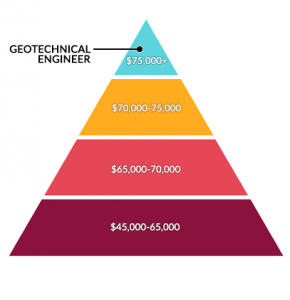Some Ideas on Geotheta You Need To Know
Some Ideas on Geotheta You Need To Know
Blog Article
Rumored Buzz on Geotheta
Table of ContentsEverything about GeothetaFascination About GeothetaThe Only Guide for GeothetaOur Geotheta DiariesGeotheta - Truths

They conduct website investigations, gather samples, carry out research laboratory tests, and examine information to assess the viability of the ground for construction jobs - Geo Tech Engineering. Based on their searchings for, geotechnical designers provide referrals for foundation design, slope stability, preserving structures, and mitigation of geotechnical risks. They work together with other experts, such as designers, architectural designers, and building and construction groups, to guarantee that geotechnical factors to consider are incorporated right into the total project design and application
By examining the behavior and homes of soil and rock, they can recognize possible geotechnical hazards such as landslides, dirt negotiation, or slope instability. Their proficiency aids stop failures or crashes that could endanger lives and residential property. Below are some detailed duties and obligations of a geotechnical designer: Site Investigation: Geotechnical designers conduct website examinations to collect data on subsurface problems.
They interpret the data to comprehend the properties and actions of the soil and rock, including their stamina, permeability, compaction qualities, and groundwater problems. Geotechnical Analysis and Style: Geotechnical engineers analyze the data collected throughout website investigations to assess the security and suitability of the site for construction jobs. They perform geotechnical estimations and modeling to review factors such as bearing capacity, negotiation, incline security, lateral planet stress, and groundwater circulation.
Examine This Report on Geotheta
Foundation Layout: Geotechnical designers play an important role in creating structures that can securely support the intended framework. They evaluate the soil problems and lots demands to identify the appropriate foundation type, such as shallow foundations (e.g., grounds), deep structures (e.g (https://yoomark.com/content/httpsgeothetacom)., piles), or specialized strategies like dirt enhancement. They consider factors such as negotiation restrictions, birthing ability, and soil-structure interaction to create optimal foundation styles
They examine construction plans, monitor site tasks, and perform field evaluations to validate that the layout referrals are complied with. If unpredicted geotechnical problems develop, they evaluate the circumstance and give suggestions for remediation or modifications to the style. Threat Assessment and Reduction: Geotechnical engineers examine geotechnical risks and risks connected with the project site, such as landslides, liquefaction, or dirt disintegration.

Cooperation and Communication: Geotechnical engineers function very closely with various other experts associated with a task, such as engineers, architectural designers, and building teams. Effective communication and partnership are important to incorporate geotechnical factors to consider into the total job style and building procedure. Geotechnical designers provide technological competence, solution questions, and ensure that geotechnical demands are satisfied.
The Main Principles Of Geotheta
Here are some types of geotechnical designers: Foundation Designer: Structure designers specialize in creating and examining foundations for structures. They examine the dirt conditions, load needs, and website attributes to determine one of the most ideal foundation type and design, such as superficial structures, deep structures, or specialized techniques like heap foundations.
They assess the aspects affecting slope stability, such as dirt homes, groundwater conditions, and slope geometry, and establish strategies to stop slope failings and reduce dangers. Quake Engineer: Earthquake engineers focus on assessing and creating structures to hold up against seismic pressures. They evaluate the seismic threat of a site, review soil liquefaction possibility, and establish seismic layout requirements to make certain the security and durability of structures during quakes.
They do field screening, collect samples, and analyze the collected information to identify the dirt properties, geologic developments, and groundwater problems at a website. Geotechnical Instrumentation Engineer: Geotechnical instrumentation designers concentrate on monitoring and determining the behavior of soil, rock, and structures. They set up and keep instrumentation systems that check variables such as soil negotiation, groundwater degrees, slope movements, and structural variations to assess efficiency and provide early cautions of potential problems.
What Does Geotheta Do?
They carry out examinations such as triaxial tests, loan consolidation examinations, direct shear examinations, and permeability tests to collect information for geotechnical analysis and style. Geosynthetics Engineer: Geosynthetics designers focus on the style and application of geosynthetic materials, such as geotextiles, geogrids, and geomembranes. They utilize these materials to boost soil security, strengthen slopes, give water drainage services, and control erosion.
They often tend to be investigatory individuals, which indicates they're intellectual, introspective, and inquisitive. They are interested, methodical, logical, analytical, and logical. Some of them are also social, implying they're kind, generous, cooperative, individual, caring, handy, compassionate, skillful, and pleasant - Consulting Engineers.
In the office atmosphere, geotechnical engineers make use of specialized software program tools to do computations, produce layouts, and evaluate data. They prepare records, evaluation job requirements, connect with clients and employee, and coordinate job activities. The office setup offers a favorable environment for research, evaluation, and collaboration with other professionals associated with the project.
What Does Geotheta Do?
They frequently see job websites to conduct website investigations, analyze geotechnical conditions, and collect data for evaluation. These check outs involve traveling to various locations, often in remote or challenging surfaces. Geotechnical designers may execute soil tasting, conduct examinations, and display construction tasks to ensure that the geotechnical elements of the task are being executed properly.
Geotechnical engineers likewise function in specialized geotechnical research laboratories. In these facilities, they perform experiments, perform tests on dirt and rock examples, and evaluate the engineering properties of the products. Geotechnical research laboratory designers work extensively in these atmospheres, taking care of testing equipment, running tools, and videotaping data. They collaborate with other lab team site to ensure precise and trustworthy testing results.
Report this page